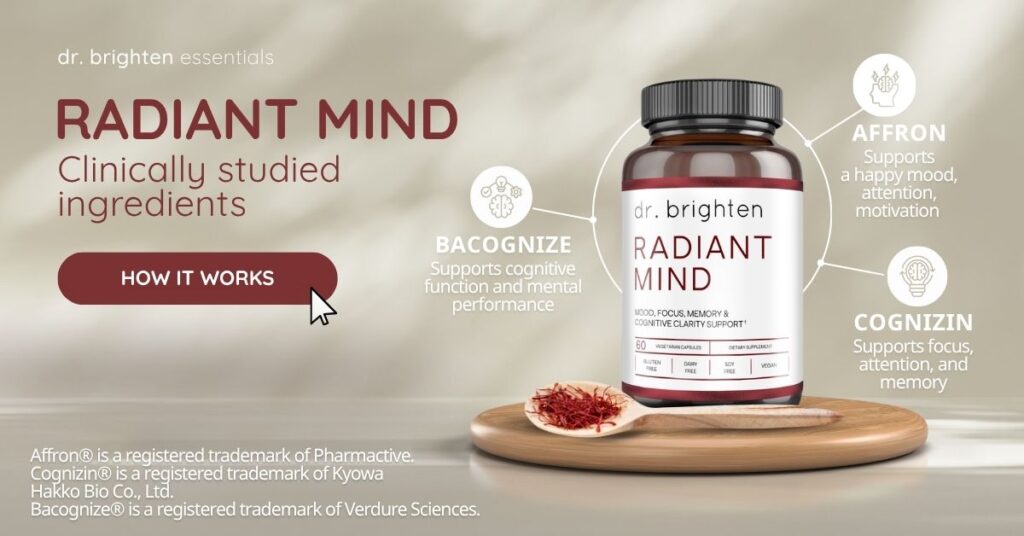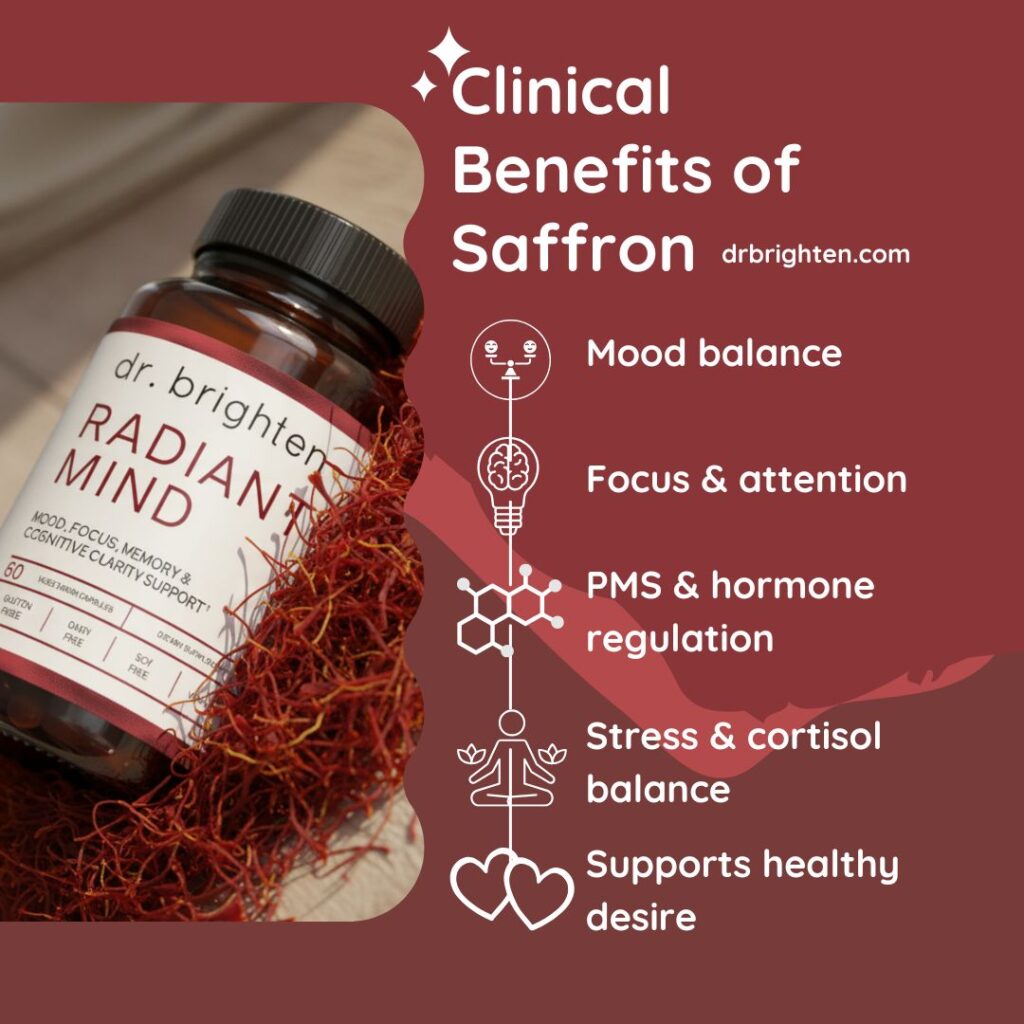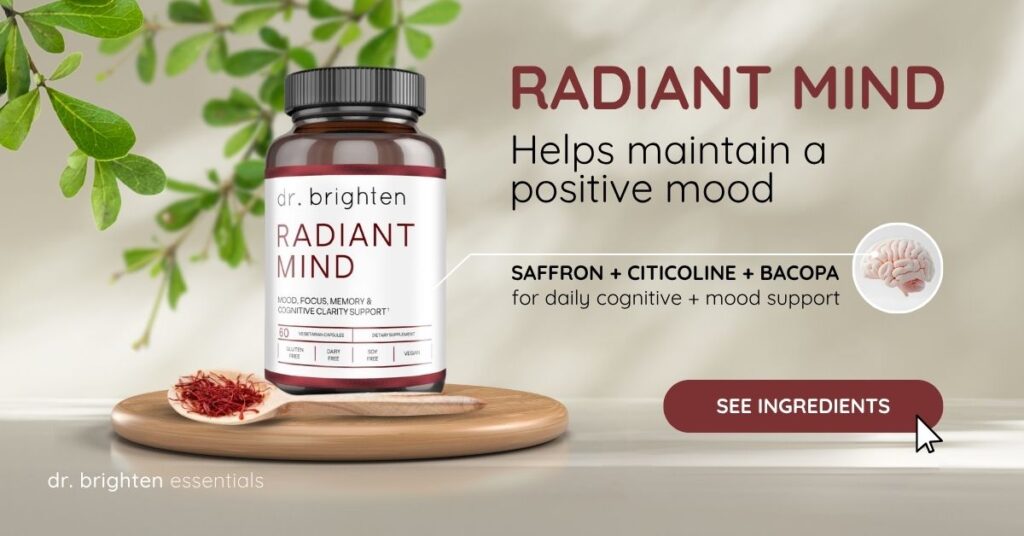If you’ve been looking for a natural way to support your mood, reduce anxious feelings, or even sharpen your focus, you may have heard about saffron.
This vibrant red spice—yes, the same one used in paella and Persian dishes—has been used medicinally for centuries. In recent years, researchers have uncovered saffron extract benefits that extend far beyond the kitchen — from improving mood to enhancing focus and emotional balance.
In this article, we’ll talk about how saffron works, its many uses (especially for mental health), and what to look for in the best saffron supplement. If you're struggling with depression, anxiety, mood swings, attention challenges like ADHD, or simply want a gentle way to support emotional balance, saffron can be worth giving a try.
In this article:
- TL;DR: Best Saffron Supplement at a Glance
- What Are the Benefits of Saffron Supplements?
- How Does Saffron Extract Work for Mood and Focus?
- Best Uses for Saffron: ADHD Focus, Depression, PMS, and Menopause Support
- What to Look For in the Best Saffron Supplement
- Top 3 Clinically Researched Saffron Supplements
- How To Take Saffron for the Best Results
- Saffron Side Effects: What You Should Know Before You Take It
- Where to Start
- Is Saffron Right for You? Key Takeaways and Next Steps
- FAQ: Best Saffron Supplement for Mood, Focus, and Hormone Balance
TL;DR: Best Saffron Supplement at a Glance
- Best dose: 28–30 mg/day of standardized extract (affron® or Safr’Inside™)
- Benefits: Mood, focus, PMS, stress, cognitive clarity
- Time to results: 4–6 weeks
- Safety: Generally well tolerated; avoid >200 mg/day
- Pair with: Magnesium, B vitamins, adaptogens for extra support
What Are the Benefits of Saffron Supplements?
Saffron is made from the dried stigmas (thread-like parts) of the Crocus sativus flower. It's rich in bioactive compounds1 like crocin, safranal, and picrocrocin, which have antioxidant, anti-inflammatory, and neuroprotective effects. This translates to saffron having the ability to influence brain chemistry, support emotional balance, and protect neurons from damage.
For example, studies suggest saffron's compounds can boost serotonin and dopamine levels, reduce oxidative stress, protect the brain, and calm neuroinflammation2, making it a natural way to improve your mood, focus, and resilience to stress.
Saffron supplements aren’t just a culinary luxury turned capsule — research shows they can have wide-ranging effects on mood, brain health, and overall wellness. Here are the most studied and noteworthy benefits:
Based on recent studies, saffron shows promise in:
- Supports a positive mood: Helps balance serotonin and dopamine, easing feelings of sadness and irritability.
- Eases mild to moderate depression: Clinical trials3 show saffron extract can work as well as some antidepressants, without common side effects and may ease mild to moderate depression4.
- Improves focus and attention: Emerging studies suggest saffron may help with ADHD symptoms, mental clarity, and concentration.
- Enhances cognitive function: Antioxidant and neuroprotective effects may support memory, learning, and mental sharpness as we age.
- Eases PMS and PMDD symptoms: Can reduce mood swings, irritability, food cravings, and discomfort linked to hormonal fluctuations.
- Supports appetite control and weight management: May decrease emotional eating and late-night snacking.
- Protects brain cells: Rich in antioxidants like crocin and safranal, saffron helps neutralize free radicals and shield neurons.
- Balances stress hormones: Modulates the HPA axis and helps regulate cortisol, promoting emotional resilience.
- Supports cardiovascular and metabolic health: Some studies show saffron may aid in regulating blood pressure and glucose levels5.
- Reduces symptoms of anxiety: Calms the nervous system and lowers stress-related inflammation.
- Improve period cramps: Saffron supplements may improve period pain and support those with PCOS6.
Related: ADHD and Hormones and The HPA Axis and Healing Anxiety
How Does Saffron Extract Work for Mood and Focus?
Saffron’s effects on mood and cognitive health appear to stem from a combination of biochemical actions in the brain and body. Here's more about how it works:
1. Boosts neurotransmitters like serotonin and dopamine
Saffron and its key compounds, particularly crocin and safranal, have been shown to help increase the availability of serotonin7 and dopamine, two “feel-good” neurotransmitters that regulate mood, motivation, and emotional balance.
Believe it or not, saffron's effects are similar to how some antidepressants8 work, but without the common side effects9 like emotional blunting or sexual dysfunction. By helping to balance mood-regulating chemicals10, including serotonin, saffron may be able to decrease depression11 symptoms such as feelings of sadness, anxiety, and irritability in some people.
2. Reduces inflammation in the brain:
Chronic inflammation in the brain (neuroinflammation) has been linked to depression, anxiety, and neurodegenerative disorders.
Saffron has anti-inflammatory properties that help calm overactive immune responses in the central nervous system, including by modulating inflammatory cytokines and protecting glial cells. This is especially helpful for people whose mood symptoms are tied to stress, hormone changes, or immune dysregulation.
3. Acts as a powerful antioxidant:
Oxidative stress can damage brain cells and impair neurotransmitter function. Crocin, one of saffron’s main carotenoids, helps neutralize free radicals and protect neurons from damage. This neuroprotective effect supports mental clarity, emotional resilience, and even cognitive function as we age.
4. Supports the HPA axis and stress response:
Saffron may also play a role in balancing the hypothalamic-pituitary-adrenal (HPA) axis, which is the body’s central stress response system.
By lowering cortisol levels and enhancing parasympathetic activity (your “rest and digest” state), saffron can help regulate how the body responds to daily stressors12 and potentially improve both emotional and physical resilience.
Why It’s in Radiant Mind™
Saffron’s ability to balance serotonin, dopamine, and calm neuroinflammation is the reason it’s a cornerstone ingredient in Radiant Mind™.
When combined with brain nutrients like citicoline (for mental energy) and bacopa (for stress adaptation), saffron’s mood-lifting and focus-enhancing benefits can be even more noticeable over time.Related: Serotonin Deficiency – What's The Risk? and How to Increase Serotonin Levels

Best Uses for Saffron: ADHD Focus, Depression, PMS, and Menopause Support
While saffron is most well-known for supporting emotional well-being, research has also found it helpful for specific groups—especially women and children—because it targets the underlying systems that affect mood, attention, and hormonal balance.
Saffron for PMS, PMDD, and Hormone Balance
Saffron has been shown to ease symptoms of PMS13 and its more severe counterpart, premenstrual dysphoric disorder (PMDD). In one study, women who took 30 mg of saffron daily experienced significant reductions in PMDD symptoms14 like mood swings, irritability, anxiety, and food cravings compared to placebo.
Researchers involved in a 2024 study15 investigating saffron concluded, “Saffron appears promising for managing dysmenorrhoea, reducing menstrual pain, regulating hormonal fluctuations, and improving overall menstrual health.” Additionally, the study mentions how saffron is being studied for many other uses, including in cancer therapy, diabetes management, mental health, stress response, cardiovascular health, postmenopausal women's well-being, and chronic obstructive pulmonary disease (COPD).
How does saffron reduce PMS and PMDD? It's thought to work by modulating serotonin, dopamine, and other neurotransmitters that fluctuate with hormonal shifts, offering a natural alternative to antidepressants and oral contraceptives (which are commonly prescribed for PMDD but can come with side effects).
Its anti-inflammatory and antioxidant effects also help to defend against conditions affecting the reproductive system16, including those affecting ovulation and fertility.
How Saffron May Support Depression and Anxiety
Clinical studies17 suggest saffron for depression and anxiety may help balance neurotransmitters like serotonin and dopamine. Saffron extract (typically 28–30 mg/day) taken for 6 weeks or longer in these studies and compared to medications such as fluoxetine (Prozac) or imipramine, in treating mild to moderate depression.
Also importantly, saffron doesn’t tend to cause common SSRI side effects—like weight gain, sexual dysfunction, or emotional numbness, which affect a high percentage of people on these medications.
Another added bonus of taking saffron for mood support is its anti-inflammatory, antioxidant, and neuroprotective properties, which can calm an overactive nervous system. This makes saffron particularly helpful for people with anxious depression or those who are sensitive to conventional psychiatric medications.
Saffron for ADHD and Focus
Emerging research has sparked interest in saffron as a natural therapy for ADHD, including those who don’t respond well to stimulant medications. A 2019 double-blind study found that saffron extract (30 mg/day) was as effective as methylphenidate (Ritalin) at reducing core ADHD symptoms like inattention, impulsivity, and hyperactivity in children over a 6-week period. However, at this time, saffron is not considered a replacement for ADHD medications.
Parents also reported fewer side effects in their children compared to traditional stimulants. Other reports suggest that saffron may support mental clarity, reduce mental fatigue, and ease “anxious ADHD” symptoms in young people18 when taken consistently.
Early research on saffron for ADHD focus shows potential for improving attention and reducing restlessness.
Clinically Studied Combination for Focus
For those seeking saffron specifically to support focus, attention, and emotional regulation, a combination formula like Radiant Mind™ provides saffron alongside complementary compounds that nourish neurotransmitters and reduce mental fatigue.
Related:
ADHD in Women: Symptoms, Causes, and Treatment
ADHD and PMDD Hormone Connection
8 Ways to Eliminate Postpartum Depression & “Mommy Brain”
What to Look For in the Best Saffron Supplement
Saffron supplements are easy to take and widely available. Simply take saffron in a capsule or extract form everyday for at least 4 to 6 weeks to test whether it has positive effects on your mood and energy.
High-quality saffron capsules made with standardized extracts offer a simple, convenient way to get consistent daily doses.
Here's how to choose the best saffron supplement for attention and emotional support:
- Look for standardized saffron extract: This ensures you're getting a consistent dose of the active compounds (usually crocin and safranal). Check labels and look for saffron listed as affron®, Safr'Inside™, or standardized extract of Crocus sativus. These are some of the most researched forms.
- Clinically studied dosage: Most studies use between 28–30 mg per day19, often divided into two 15 mg capsules. Some use higher dosage, such as 90 mg/day, depending on the condition being treated.
- Clean ingredients: Choose products without artificial fillers, dyes, or unnecessary additives.
- Third-party tested: This guarantees purity and potency.
- Consider pairing it with other nutrients for additional support: Some saffron capsules are paired with other calming nutrients like magnesium, B vitamins, or adaptogens, which can enhance effects.
Top 3 Clinically Researched Saffron Supplements
When comparing saffron supplements, the key is to look for standardized extracts backed by clinical research. Standardization ensures that every capsule delivers a consistent amount of the active compounds—especially crocin and safranal—responsible for saffron’s mood and focus benefits.
Two of the most studied extracts—affron® vs Safr’Inside™—are often compared for purity, standardization, and clinical outcomes.
Below is a comparison of the top clinically researched saffron ingredients and one premium formula that combines saffron with other brain-supportive nutrients.
| Supplement / Extract | Standardization & Dose | Research Highlights | Ideal For |
| affron® | 3.5% Lepticrosalides® (bioactive compounds), 28–30 mg/day | Backed by 10+ human clinical trials for mood, stress, sleep, and focus support | Adults and teens looking to support mood, emotional balance, or ADHD focus |
| Safr’Inside™ | 0.3% safranal; 2% crocin, 30 mg/day | Clinically studied for emotional balance, appetite control, and stress resilience | Women with PMS, PMDD, or emotional eating patterns |
| Radiant Mind™ by Dr. Brighten Essentials | Features affron® saffron extract (30 mg) + Cognizin® citicoline + Bacognize® bacopa + zinc1 capsule twice daily or 2 caps in the morning | Combines clinically studied nutrients for mood, cognition, and stress adaptation | Adults seeking focus, clarity, and calm—especially during perimenopause, ADHD, or high-stress periods |
If you’re choosing a saffron supplement, look for a standardized extract with human clinical data—such as affron® or Safr’Inside™.For a more comprehensive formula that also supports focus, motivation, and cognitive resilience, a blend like Radiant Mind™ may be ideal. Radiant Mind™ by Dr. Brighten Essentials combines clinically studied affron® saffron extract (30 mg) with Bacognize® bacopa, Cognizin® citicoline, and zinc—nutrients shown to support mood, focus, and cognitive resilience.

How To Take Saffron for the Best Results
Most clinical trials exploring saffron dosage for mood use 28–30 mg daily, often split into two doses for steady support.
You can take saffron with or without food, but taking it with meals can help to reduce any chance of a stomach upset. Be consistent and have some patience, as most people notice results after 4 to 6 weeks of daily use.
Saffron Side Effects: What You Should Know Before You Take It
Saffron is generally considered very safe when taken in moderate amounts. However, high doses above 200 mg/day can potentially cause side effects and even be toxic. Doses over 400 mg/day may cause serious side effects, so be sure not to take too much.
Side effects of saffron are rare but can include:
- Digestive upset (nausea, bloating)
- Headache
- Drowsiness (in very sensitive individuals)
If you’re pregnant, nursing, or on mood medications, check with your healthcare provider before starting saffron just to be safe.
Safety, Interactions & Who Should Avoid It
- Saffron is considered safe at typical doses (28–30 mg/day).
- Avoid high doses (>200 mg/day).
- People who are pregnant, taking SSRIs, or on anticoagulants should consult a clinician before use.
- Always choose third-party tested brands to ensure identity and purity.
Disclaimer: This article is for informational purposes and not a substitute for medical advice.
Where to Start
If you’re ready to try saffron, choose a clinically studied extract and give it at least 4–6 weeks of consistent use.
Radiant Mind™ is formulated with affron® saffron extract at the research-supported dose, plus nutrients that work synergistically to support focus, calm, and overall brain health.
Available through DrBrightenEssentials.com, third-party tested, and physician formulated for women’s unique brain and hormone needs.
Is Saffron Right for You? Key Takeaways and Next Steps
If you’re looking for a gentle, holistic way to support your mood, focus, and emotional well-being, saffron might be worth considering. It’s especially helpful for women navigating hormonal shifts, emotional overwhelm, or attention challenges like ADHD.
When choosing a saffron supplement:
- Stick to researched doses (28–30 mg/day)
- Look for clean, standardized extracts
- Be patient and consistent for at least 4–6 weeks
And remember, supplements should always be paired with lifestyle support. Eating a nutrient-rich diet, getting daily movement, regulating your nervous system, and tending to your sleep and stress will help you feel your best, whether you’re taking saffron or not.
Looking for other ways to improve your focus and mood? Explore my free guide: The ADHD Woman’s Hormone & Brain Sync Guide. It’s designed to help you naturally support concentration, energy, and emotional balance through every phase of your cycle.
FAQ: Best Saffron Supplement for Mood, Focus, and Hormone Balance
Saffron extract supports emotional balance, focus, and stress resilience by influencing serotonin, dopamine, and the body’s stress-response system (HPA axis). Clinical studies show it can ease mild to moderate depression, support attention in ADHD, reduce PMS symptoms, and promote overall well-being.
Look for standardized, clinically studied extracts such as affron® or Safr’Inside™. These forms have been evaluated in multiple human trials for mood, cognitive, and stress benefits.
Radiant Mind™ by Dr. Brighten Essentials uses affron® at the researched dose (30 mg) and pairs it with brain-supportive nutrients—making it a high-quality, physician-formulated option for those seeking both mental clarity and calm.
Most people notice a difference in mood, focus, or emotional resilience after 4 to 6 weeks of consistent use. Some individuals report early improvements in sleep quality or calm within two weeks.
Consistency matters—saffron works best when taken daily at the clinically studied dose.
Clinical studies typically use 28 to 30 mg of standardized saffron extract per day, often split into two doses. Higher doses are not necessarily more effective and may increase side-effect risk.
Early studies suggest saffron may support focus, attention, and emotional regulation by balancing dopamine and serotonin levels. In one clinical trial, saffron extract performed comparably to methylphenidate (Ritalin®) for core ADHD symptoms over six weeks—with fewer reported side effects.
While more research is needed, saffron is emerging as a promising complementary option for adults and children with attention challenges.
Yes. Multiple studies show that saffron can ease premenstrual mood swings, irritability, and cravings by stabilizing neurotransmitters affected by hormonal fluctuations. Women in clinical trials experienced significant reductions in PMS and PMDD symptom scores after taking 30 mg per day for two menstrual cycles.
Saffron is considered very safe at typical doses (28–30 mg/day). Mild effects like digestive upset or drowsiness are rare. Doses above 200 mg/day can be irritating or toxic, so avoid exceeding recommendations.
Always check with your healthcare provider before combining saffron with antidepressants or other serotonin-enhancing medications.
Yes—daily use is safe at standard doses and often necessary to maintain benefits. Saffron works cumulatively by modulating brain chemistry and stress-response pathways. Pairing it with nutrient-dense foods, good sleep, and nervous-system regulation enhances its effects.
Because high doses may stimulate uterine activity, pregnant or breastfeeding individuals should avoid saffron supplements unless approved by their clinician. Culinary use of saffron as a spice is considered safe in normal food amounts.
– Standardized extract (e.g., affron® or Safr’Inside™)
– Clinically studied dose (28–30 mg/day)
– Third-party testing for identity, potency, and purity
– No artificial dyes or fillers
– Clear labeling of saffron species (Crocus sativus L.)
Yes—saffron pairs well with nutrients that support neurotransmitter function, such as magnesium, B vitamins, and citicoline. It’s often combined with bacopa for enhanced stress adaptation and cognitive clarity.
Saffron does not block serotonin reuptake like SSRIs but may support natural serotonin signaling and reduce inflammation that interferes with neurotransmitter balance. This means many people experience mood support without the sexual side effects or fatigue associated with some medications.
Saffron can be used alongside therapy and healthy lifestyle habits but should never replace prescribed treatment without professional guidance.
Look for supplements that specify their extract type and dosage on the label. affron® and Safr’Inside™ are the most clinically validated.
References
- https://pmc.ncbi.nlm.nih.gov/articles/PMC6266642/ ↩︎
- https://pubmed.ncbi.nlm.nih.gov/36244518/ ↩︎
- https://pmc.ncbi.nlm.nih.gov/articles/PMC6266642/ ↩︎
- https://pmc.ncbi.nlm.nih.gov/articles/PMC9000812/ ↩︎
- https://pubmed.ncbi.nlm.nih.gov/38694315/ ↩︎
- https://pubmed.ncbi.nlm.nih.gov/38558480/ ↩︎
- https://pmc.ncbi.nlm.nih.gov/articles/PMC4643654/ ↩︎
- https://www.sciencedirect.com/science/article/abs/pii/S0165032713007970?via%3Dihub ↩︎
- https://pmc.ncbi.nlm.nih.gov/articles/PMC8395812/ ↩︎
- https://onlinelibrary.wiley.com/doi/10.1002/hup.2434 ↩︎
- https://www.mdpi.com/2072-6643/17/5/809 ↩︎
- https://pmc.ncbi.nlm.nih.gov/articles/PMC7882499/ ↩︎
- https://pubmed.ncbi.nlm.nih.gov/18271889/ ↩︎
- https://pmc.ncbi.nlm.nih.gov/articles/PMC7792881/ ↩︎
- https://pubmed.ncbi.nlm.nih.gov/38694315/ ↩︎
- https://pubmed.ncbi.nlm.nih.gov/38558480/ ↩︎
- https://www.naturalmedicinejournal.com/journal/saffron-powerfully-modulates-anxiety-and-depression ↩︎
- https://pubmed.ncbi.nlm.nih.gov/29510352/ ↩︎
- https://pubmed.ncbi.nlm.nih.gov/29068592/ ↩︎





